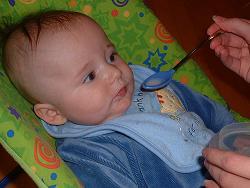Eating cereal is an important developmental step for babies. Not only does it mean a little more independence from nursing or bottle feeding, but it also means that your baby is meeting physical development milestones for head control and reflexes. While there are risks to giving babies cereal too soon, knowing the signs that your baby is ready for solid foods can minimize these risks.
Eating cereal is an important developmental step for babies. Not only does it mean a little more independence from nursing or bottle feeding, but it also means that your baby is meeting physical development milestones for head control and reflexes. While there are risks to giving babies cereal too soon, knowing the signs that your baby is ready for solid foods can minimize these risks.
Misconceptions
Many parents are eager to start feeding babies cereal. Spurred on by well-intentioned friends and relatives who frequently pass on the anecdote that adding cereal to a baby’s bottle at night can help him sleep, it’s tempting to try it to get a full night’s sleep. Unfortunately, there’s no evidence supporting this claim. In fact, it’s a baby’s immature nervous system that causes him to wake at night, not hunger.
Risks
Feeding cereal to your baby too soon, whether by spoon or by bottle, actually holds more risks than benefits. According to pediatric expert Dr. Alan Greene starting a baby on cereal or other solid foods before he’s 4 months old can increase his risk of developing food allergies. Additionally, both Dr. Greene and the Mayo Clinic warn parents that putting cereal in a baby’s bottle can override the body’s mechanism for recognizing fullness, putting babies at risk for eating difficulties and obesity as they get older (see Resources below).
Time Frame
The best way to know when your baby is ready to eat cereal is to look at his physical development as opposed to his chronological age. If you stick to a hard-and-fast rule of beginning solid food between 4 and 6 months of age, then premature babies or infants with developmental delays may not be ready. If you can answer "no" to any of the following questions, you should probably delay giving your baby cereal to eat. * Can my baby sit with support for as long as a feeding would take? * Is my baby able to hold up his head without difficulty or excessive wobbling? * Does my baby seem to be interested in watching me eat solid food?
Cereal Feeding
Even if all the physical signs are there, the only way to know if it’s too soon to give your baby cereal is to try it. Mix 1 tsp. of rice (or other single-grain infant cereal) with approximately 4 tbsp. of formula or breast milk. Though the resulting mixture may seem too soupy, it’s just thick enough to see whether your baby’s swallow reflex is mature enough to begin solid foods. Seat your baby in an upright position, place a tiny amount on a baby spoon and place it in the front of his mouth. If he’s able to move the cereal from the front to the back of his mouth with his tongue and swallow it, then he’s ready to begin eating cereal.
Cereal and Food Allergies
One thing to note when starting your baby on solid foods, cereal included, is the potential of food allergies or sensitivities. It’s recommended that you only introduce one new food at a time, allowing about a week in between foods, to see how your baby will react to it. This means you should start with a single-grain cereal, such as rice, oatmeal or barley and wait before starting a new one.





